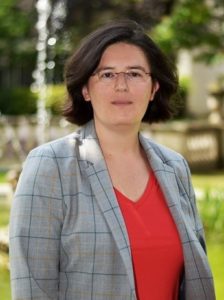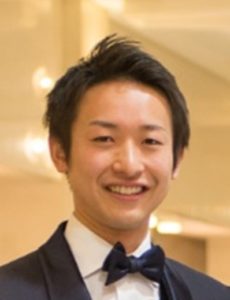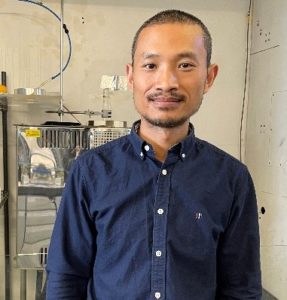 Sophie Carenco graduated from Ecole Polytechnique, Palaiseau, in 2008. She obtained her PhD in 2011 from University Pierre & Marie Curie, Paris, for her work on the synthesis and applications of metal phosphide nanoparticles. From 2012 to 2013, she was a post-doctoral fellow at Lawrence Berkeley National Lab, Berkeley, California, in the group of Prof. Miquel Salmeron, where she used synchrotron-based in situ spectroscopies to monitor the surface state of metallic nanoparticles during catalytic reactions.
Sophie Carenco graduated from Ecole Polytechnique, Palaiseau, in 2008. She obtained her PhD in 2011 from University Pierre & Marie Curie, Paris, for her work on the synthesis and applications of metal phosphide nanoparticles. From 2012 to 2013, she was a post-doctoral fellow at Lawrence Berkeley National Lab, Berkeley, California, in the group of Prof. Miquel Salmeron, where she used synchrotron-based in situ spectroscopies to monitor the surface state of metallic nanoparticles during catalytic reactions.
In 2014, she joined CNRS as a researcher in Laboratoire de Chimie de la Matière Condensée de Paris (LCMCP), associated with Sorbonne Université, CNRS and Collège de France. She works on novel synthetic routes of exotic nanomaterials for energy-relevant challenges such as CO2 valorization. In 2017, she was awarded an ERC Starting Grant to work on small molecules activation at the surface of nanoparticles.
She was awarded the European Young Chemist Award from EuCheMS in 2010 and the C’Nano National Award in 2012 for her PhD work. More recently, she was awarded the Bronze Medal of CNRS, the Jean Rist Medal of SF2M. In relation with the interdisciplinary character of her research, she received the Young Researcher Award of Physical Chemistry division of SCF-SFP (2018) and the Young Researcher Award of the Catalysis Division of the French Chemical Society (2021). In 2020, she was the recipient of the Clara Immerwahr Award, from the German consortium UniSysCat. In 2021, she received the Researcher Award from the Solid State Chemistry division of the French Chemical Society. She is also involved in science outreach: she published in 2012 a short book about nanomaterials and chemistry.
Read her Emerging Investigator article “Influence of the copper precursor on the catalytic transformation of oleylamine during Cu nanoparticle synthesis” and read more about her in the interview below:
How do you feel about Catalysis Science & Technology as a place to publish?
As my work deals with reactivity and catalysis at the frontier of homogeneous and heterogeneous catalysis, this journal is a nice venue to publish our latest results. I enjoy the fact that mechanistic works, focused on deciphering the underlying processes rather than on the catalysts performance, are welcome in CatSciTech.
What aspect of your work are you most excited about at the moment and what do you find most challenging about your research?
I am excited about our research line on colloidal catalysis, which is neither traditional homogeneous catalysis nor typical of heterogeneous catalysis studies. In the ERC project “NanoFLP”, we focus on the interface of metal-containing nanoparticles with solutions containing strong ligands. Nowadays, a range of tools are available to monitor this interface, which provides us with new insights on the dynamics of the interface, and an opportunity to enhance the reactivity toward small molecules.
In your opinion, what are the most important questions to be asked/answered in this field of research?
I believe we should pursue a fundamental approach that properly characterizes the amount and nature of surface ligands, while also considering the exchanges with the surrounding solution and the metal core restructuring. Both phenomena are intertwined. We should expand the variety of examples, beyond the typical CdSe or gold nanoparticles, reaching to multimetallic nanoparticles but also less common phases such as metal carbides or metal oxysulfides.
Can you share one piece of career-related advice or wisdom with other early career scientists?
I would mention two things: First, don’t work in a bubble, seek feedback from your advisors but also from your peers, which you can do at your university or through younger chemists networks such as IYCN or YEuCAT. Second, target the core question in your research topic sooner than later: you will be able to optimize yields or performance only if you get an in-depth understanding of the catalyst you work with.
Follow @SophieCARENCO on Twitter to keep updated with her and her research!












